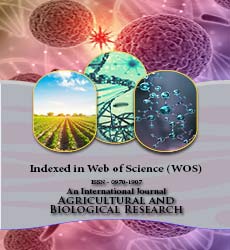Agricultural and Biological Research
RNI # 24/103/2012-R1
Albert Ukaro Ofuoku*, Agatha Arimiche Nwabueze and Arnold Ebuka Irabor
The study was carried out with the view to examine fish farming technology change management in river communities of Delta state, Nigeria. A sample size of 166 fish farmers were used for the study. Questionnaire and interview schedule were used to collect data from the respondents. Descriptive and inferential statistics were used to analyze the data. Most of the farmers were young people with (93.37%) of them. Majority of them had tertiary education. Majority of the farmers were intrinsically motivated to embark on change from earth pond and surface tank management system to the fish cage management system. Average household size was 5 persons. Majority (68.07%) of them embarked on the change slowly. The fish cage technology had relative advantages of being not complex to use, triable, being easily observed and less cost of procurement over surface and earth pond. Majority of the fish farmers were adjudged to be efficient in the management of change from the earth and surface pond to floating fish cage. Relative advantage, relevance, capacity to change, change in management experience, motivation and formal education had significant and positive relationship on change in management efficiency. Complexity and cost had significant and negative relationship on change in management efficiency. Challenges of floating fish cage management included poaching, predators and biofouling. Government should provide access to credits for farm fishers at low interest rates. The usage of floating fish cage technology management system should be encouraged and sustained. The fish farmer’s clusters should hire the services of local security men to solve the problem of poaching. Traps should be placed around cages to discourage predators anti-fouling preventive measures and treatments are required to counteract biofouling problems. Technology usage training is recommended.
